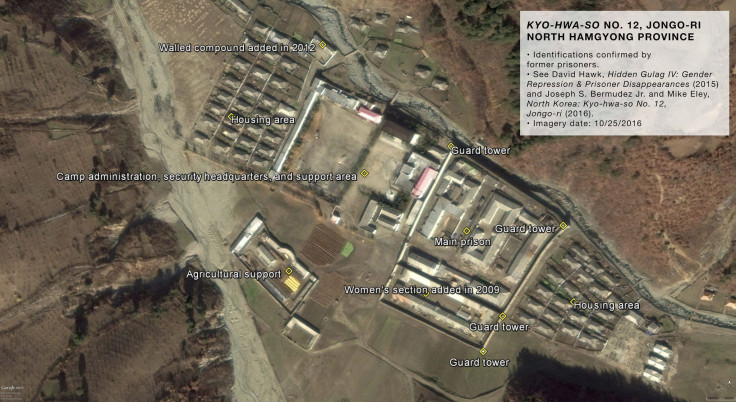North Koreans Who Make Too Much Money Could End Up In Prison Camp

The Committee for Human Rights in North Korea (HRNK) released a report Thursday analyzing North Korean prison camps using new satellite images combined with the accounts of former prisoners. The report also translated a 2012 version of the North Korean criminal code into English.
The report titled “The Parallel Gulag: North Korea’s ‘An-jeon-bu’ Prison Camps” shines a spotlight on the “reeducation” prison camps that are for people who have broken the law in North Korea, but aren’t political prisoners. Conditions in these camps are harsh, but these prisoners at least have a chance of release, unlike political prisoners. Crimes that could land a person in one of these prison camps include everything from having too much money and not giving it back to the state to criticizing the government, even privately.
Former prisoners have called many of North Korea’s statutes “crimes that are not really crimes,” according to the report.
“A lot of the people in these prisons are there for crimes that would not be crimes in another country,” said David Hawk, the report’s author to the Washington Post Wednesday.
Prisoners for less severe non-political crimes often have fixed sentences, but are still subject to horrible conditions such as forced labor and starvation like political prisoners. Both kinds of prisoners are subject to crimes against humanity, according to the United Nations, but political prisoners are often imprisoned for life and, historically, as are the next three generations of their families. Political prisoners “disappear” and isolated from the outside world forever. Political prison camps are run by the secret police and North Korea denies their existence.
North Koreans don’t deny the prison camps for non-political prisoners, but the people held there are still subject to difficult forced labor including mining and farming with rudimentary tools. Medical supplies or attention is rare at these camps, and women are often denied feminine hygiene products. Death is not uncommon.
The lion’s share of attention on North Korea is usually focused on its nuclear and missile programs, and HRNK wanted to highlight the country’s human rights abuses with the report.
“Even as the world is transfixed by the slings and arrows surrounding vital nuclear weapons considerations, it is more important than ever to ensure that the fate of everyday North Koreans trapped in the unyielding gulag systems remains at the forefront of our efforts and the efforts of the international community. Furthermore, there is an undeniable nexus between North Korea’s human rights violations and the security threats it poses,” said Greg Scarlatoiu, the committee executive director in a statement.
An estimated 120,000 North Koreans are believed to be held in these camps.
© Copyright IBTimes 2025. All rights reserved.




















